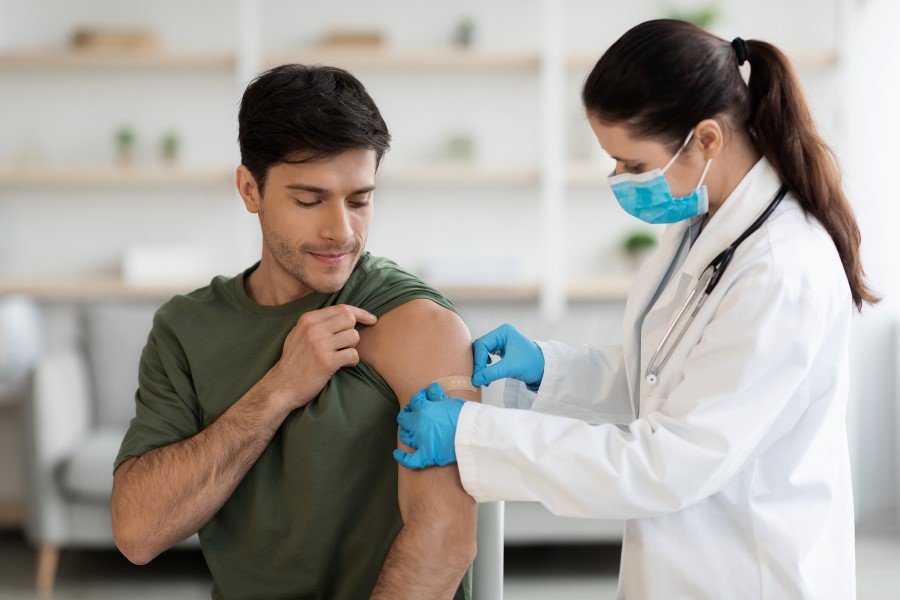
Asking people to choose a COVID-19 vaccine rather than asking whether they would get vaccinated can reduce vaccine hesitancy, even across party lines, according to new University of Minnesota research published in Vaccine.
Carlson School of Management Marketing Professor Akshay Rao, who led the study with graduate students Xianyu (Bonnie) Hao, Mayank Anand, and Carlson School alum Tzushuo (Ryan) Wang, says this subtle shift in strategy avoids a potential roadblock in people’s decision-making process.
“Instead of starting with asking whether to vaccinate, you start with asking them to consider which vaccine,” said Rao. “The brain assumes the decision to vaccinate has already been made, and now it’s a question of how. By changing the frame of the question, you get greater compliance.”
For the study, the researchers collected responses from April through May of 2021 from more than 1,700 people, who were randomly assigned to one of two survey conditions. One group received the deliberative probe, which asked them to rate their willingness to get vaccinated. The other group received the comparative probe, which asked them to choose a vaccine: Pfizer, Moderna, Johnson & Johnson or none. Both surveys also asked about political affiliation and demographics. The researchers determined:
- Asking people to choose which vaccine reduced vaccine hesitancy by six percent, on average.
- The effect was even larger among pro-Trump Republicans, with vaccine hesitancy reduced by about 10 percent.
Rao believes the comparative question resonated with pro-Trump Republicans because it eliminated the possibility of counter-argumentation over whether to get vaccinated. Instead, the question immediately moved the conversation to a discussion over the available options. This finding builds on existing research that pro-Trump Republicans may be more inclined to heuristic thinking, or taking mental shortcuts to process information when making decisions.
“The vaccination debate created strong political divides,” said Rao. “While this strategy may not sway those at the farthest ends of the spectrum, the findings show there are those within the vaccine-hesitant group who are responsive to this nudge and would ultimately choose to get vaccinated.”
Tactics like vaccine mandates and lotteries can be costly and lead to backlash. Rao suggests the comparative approach could be used for in-person interactions as well as advertising. In a clinical setting, healthcare workers could simply ask patients which of the available options they would like to select. Advertisements could emphasize a menu of vaccine choices and offer a QR code to scan and sign up for an appointment.
“This comparative question strategy is a subtle, low-cost change that could provide the nudge needed for millions of people to get protection from immunizable diseases–from COVID-19 to the flu–and ultimately save lives,” said Rao.
Rao says he hopes to expand upon this research with field tests in clinics.
–30–
Copies of this paper are available to credentialed journalists upon request; please contact Elsevier's Newsroom at [email protected].
“Reducing COVID vaccine hesitancy by inducing a comparative mindset.” Xianyu (Bonnie) Hao, Mayank Anand, TzuShuo (Ryan) Wang, Akshay R. Rao. https://doi.org/10.1016/j.vaccine.2022.10.077. Vaccine. Elsevier.
About the Carlson School of Management
Located on the University of Minnesota Twin Cities campus, the Carlson School of Management exemplifies a commitment to excellence through a focus on experiential learning and international education, and by maintaining strong ties with the Minneapolis/Saint Paul business community. Through its undergraduate and graduate programs, the Carlson School offers access to world-renowned faculty members and an alumni network of 55,000 people. Learn more at carlsonschool.umn.edu.
About Vaccine
Vaccine is the pre-eminent journal for those interested in vaccines and vaccination. It is the official journal of The Edward Jenner Society and The Japanese Society for Vaccinology and is published by Elsevier. www.elsevier.com/locate/vaccine
About Elsevier
As a global leader in information and analytics, Elsevier helps researchers and healthcare professionals advance science and improve health outcomes for the benefit of society. We do this by facilitating insights and critical decision-making for customers across the global research and health ecosystems. In everything we publish, we uphold the highest standards of quality and integrity. We bring that same rigor to our information analytics solutions for researchers, health professionals, institutions and funders.
Elsevier employs 8,700 people worldwide. We have supported the work of our research and health partners for more than 140 years. Growing from our roots in publishing, we offer knowledge and valuable analytics that help our users make breakthroughs and drive societal progress. Digital solutions such as ScienceDirect, Scopus, SciVal, ClinicalKey and Sherpath support strategic research management, R&D performance, clinical decision support, and health education. Researchers and healthcare professionals rely on our over 2,700 digitized journals, including The Lancet and Cell; our over 43,000 eBook titles; and our iconic reference works, such as Gray's Anatomy. With the Elsevier Foundation and our external Inclusion & Diversity Advisory Board, we work in partnership with diverse stakeholders to advance inclusion and diversity in science, research and healthcare in developing countries and around the world.
- Categories:
- Health
- COVID-19
- Infectious diseases
- Research




